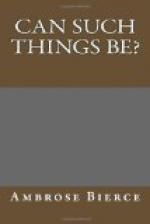I sought someone whom I had never seen, yet knew that I should recognize when found. My quest was not aimless and fortuitous; it had a definite method. I turned from one street into another without hesitation and threaded a maze of intricate passages, devoid of the fear of losing my way.
Presently I stopped before a low door in a plain stone house which might have been the dwelling of an artisan of the better sort, and without announcing myself, entered. The room, rather sparely furnished, and lighted by a single window with small diamond-shaped panes, had but two occupants; a man and a woman. They took no notice of my intrusion, a circumstance which, in the manner of dreams, appeared entirely natural. They were not conversing; they sat apart, unoccupied and sullen.
The woman was young and rather stout, with fine large eyes and a certain grave beauty; my memory of her expression is exceedingly vivid, but in dreams one does not observe the details of faces. About her shoulders was a plaid shawl. The man was older, dark, with an evil face made more forbidding by a long scar extending from near the left temple diagonally downward into the black mustache; though in my dreams it seemed rather to haunt the face as a thing apart—I can express it no otherwise—than to belong to it. The moment that I found the man and woman I knew them to be husband and wife.
What followed, I remember indistinctly; all was confused and inconsistent—made so, I think, by gleams of consciousness. It was as if two pictures, the scene of my dream, and my actual surroundings, had been blended, one overlying the other, until the former, gradually fading, disappeared, and I was broad awake in the deserted cabin, entirely and tranquilly conscious of my situation.
My foolish fear was gone, and opening my eyes I saw that my fire, not altogether burned out, had revived by the falling of a stick and was again lighting the room. I had probably slept only a few minutes, but my commonplace dream had somehow so strongly impressed me that I was no longer drowsy; and after a little while I rose, pushed the embers of my fire together, and lighting my pipe proceeded in a rather ludicrously methodical way to meditate upon my vision.
It would have puzzled me then to say in what respect it was worth attention. In the first moment of serious thought that I gave to the matter I recognized the city of my dream as Edinburgh, where I had never been; so if the dream was a memory it was a memory of pictures and description. The recognition somehow deeply impressed me; it was as if something in my mind insisted rebelliously against will and reason on the importance of all this. And that faculty, whatever it was, asserted also a control of my speech. “Surely,” I said aloud, quite involuntarily, “the MacGregors must have come here from Edinburgh.”




